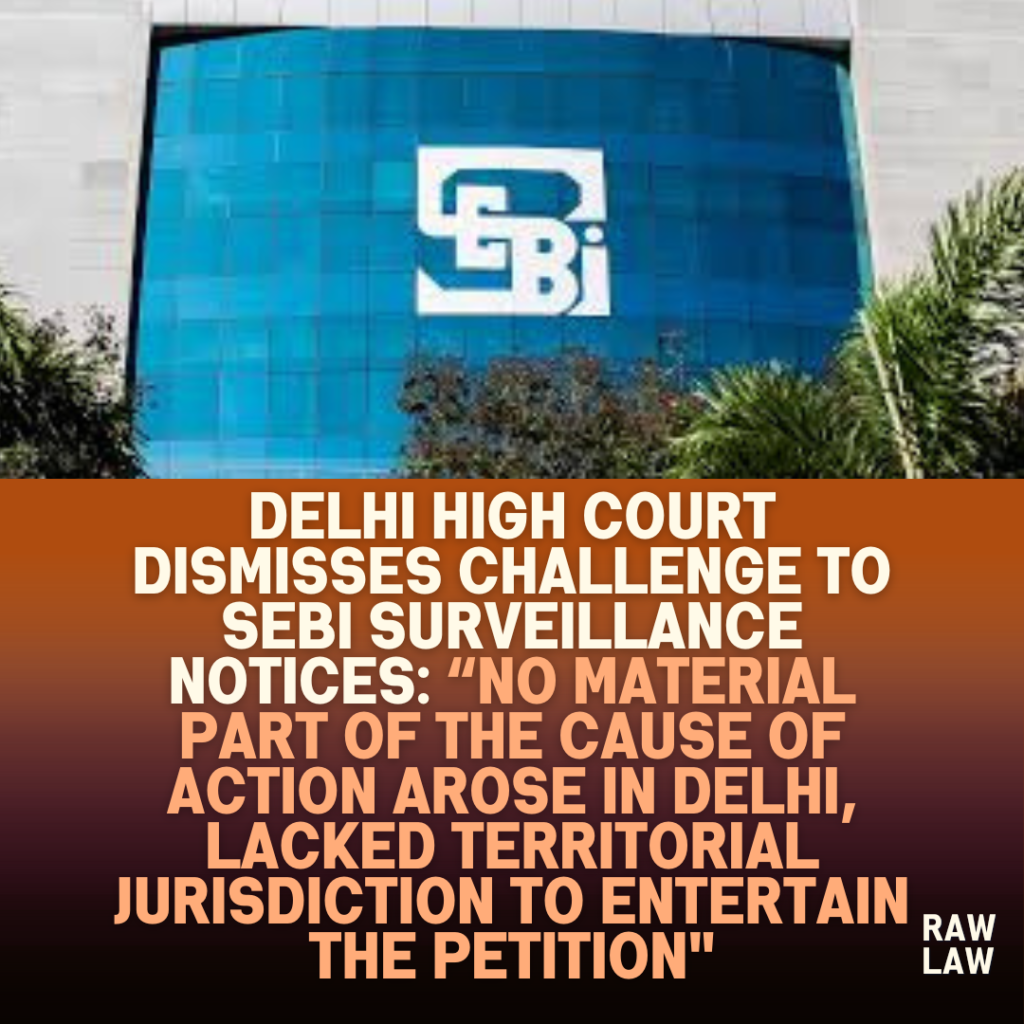Court’s Decision
The Delhi High Court, in a judgment dated 9 June 2025, dismissed a writ petition filed by Kairosoft AI Solutions Ltd., challenging surveillance notices issued by the Bombay Stock Exchange (BSE) under the Graded Surveillance Measure (GSM) framework. The Court held that:
“No material, essential or integral part of cause of action has arisen in Delhi. The impugned notices were issued from Mumbai, and the entire correspondence, implementation, and effect emanate from BSE’s actions at Mumbai.”
Accordingly, the Court held that it lacked territorial jurisdiction to entertain the petition and granted liberty to the petitioners to approach the jurisdictional High Court.
Facts
The petitioner company was aggrieved by two notices dated 3 April and 4 April 2025 published by BSE placing its shares in GSM Stage IV, following the circulation of YouTube videos recommending its stock. A general administrative circular dated 24 February 2023 was also challenged, which allowed BSE to initiate GSM surveillance actions in such cases.
In February–March 2025, the company conducted a Rights Issue of 8,00,000 equity shares. Following BSE’s listing approval, the company’s stock saw a price rise from ₹232.55 to ₹271.04 between 20 March and 28 March 2025, even hitting the upper circuit. Subsequently, videos and social media content recommending the stock began circulating.
Despite clarifications and compliance by the company with BSE’s instructions, the shares were placed in GSM Stage IV. This stage restricted trading to Mondays only and imposed an additional surveillance deposit of 100% on purchasers.
Issues
- Whether the Delhi High Court had territorial jurisdiction to entertain the writ petition under Article 226(2) of the Constitution?
- Whether the impugned circular and notices violated the principles of natural justice and were issued without statutory backing?
Petitioners’ Arguments
The petitioners, through Senior Advocate Kapil Sibal, argued that:
- The petitioners were affected in Delhi where the company’s registered office is located and where the YouTube videos were accessed.
- The cause of action partially arose in Delhi since the correspondence from BSE was received at Delhi, and shareholders were affected there.
- The impugned circular lacked statutory basis and resulted in civil consequences (restrictions on trading and surveillance deposit) without notice or hearing, violating Article 14 and principles of natural justice.
- Cited Kusum Ingots, Om Prakash Srivastava, and Maharashtra Chess Association to contend that partial cause of action was sufficient and that an exclusive jurisdiction clause in BSE’s rules could not oust writ jurisdiction under Article 226.
Respondents’ Arguments
BSE and SEBI, represented by Senior Advocates Pratap Venugopal and Neeraj Malhotra, objected to the maintainability of the petition in Delhi, asserting:
- All actions challenged — issuance of notices, circular, implementation of surveillance — were taken by BSE at Mumbai.
- Clause 2 of the Listing Agreement and Rule 1.3 of BSE Rules established exclusive jurisdiction in Mumbai.
- The cause of action, if any, arose solely at Mumbai, where BSE is headquartered, and where trading platforms and servers are located.
- Relied on Ashoka Marketing Ltd. v. SEBI (2024), Summit Online Trade Solutions (2023), and ONGC v. Utpal Basu (1994) to emphasize the importance of material and integral facts in determining jurisdiction.
Analysis of the Law
The Court reiterated the settled legal principles:
- Under Article 226(2), a High Court must assess whether the facts pleaded constitute a material, essential, or integral part of the cause of action.
- Mere location of the registered office or access to website-based notices in a particular jurisdiction is not sufficient unless it forms a material part of the dispute.
- Reliefs must flow from the facts pleaded, which must be germane to the challenge.
Precedent Analysis
- State of Goa v. Summit Online Trade Solutions (2023) 7 SCC 791 – Held that only facts which are imperative to obtain the relief claimed can confer jurisdiction under Article 226(2).
- Ashoka Marketing Ltd. v. SEBI (2024 SCC OnLine Del 6731) – Reiterated that situs of shares or receipt of an impugned order in Delhi is not a material part of the cause of action.
- ONGC v. Utpal Basu (1994) 4 SCC 711 – Held that mere sending of faxes or accessing notices in a jurisdiction does not confer territorial jurisdiction.
- Kusum Ingots v. Union of India (2004) 6 SCC 254 – While it permits choice of forum where part of cause of action arises, it must be material and not illusory.
Court’s Reasoning
Justice Vikas Mahajan ruled:
- The core grievance of the petitioners concerned notices and circulars issued and implemented by BSE in Mumbai.
- Accessing the notices from Delhi, or complaints to Cyber Cell in Delhi, were incidental and not material to the legal challenge.
- The registered office being in Delhi and shareholders being affected in Delhi were insufficient to establish territorial jurisdiction.
- The “cause of action” must be tied to the relief claimed. Since no action complained of took place in Delhi, this Court lacked jurisdiction.
Conclusion
The Court dismissed the writ petition, holding that no part of the cause of action arose in Delhi. It granted liberty to the petitioners to approach the appropriate court having jurisdiction, i.e., the Bombay High Court.
Implications
This judgment reinforces the principle that mere location of a company’s registered office or peripheral events in a jurisdiction do not suffice to invoke writ jurisdiction unless the core action giving rise to the dispute took place there. It provides clarity on forum shopping in securities litigation and strengthens the role of jurisdictional scrutiny in regulatory challenges.
Also Read: Gujarat High Court Allows Release of Seized Vehicle Under Article 226
